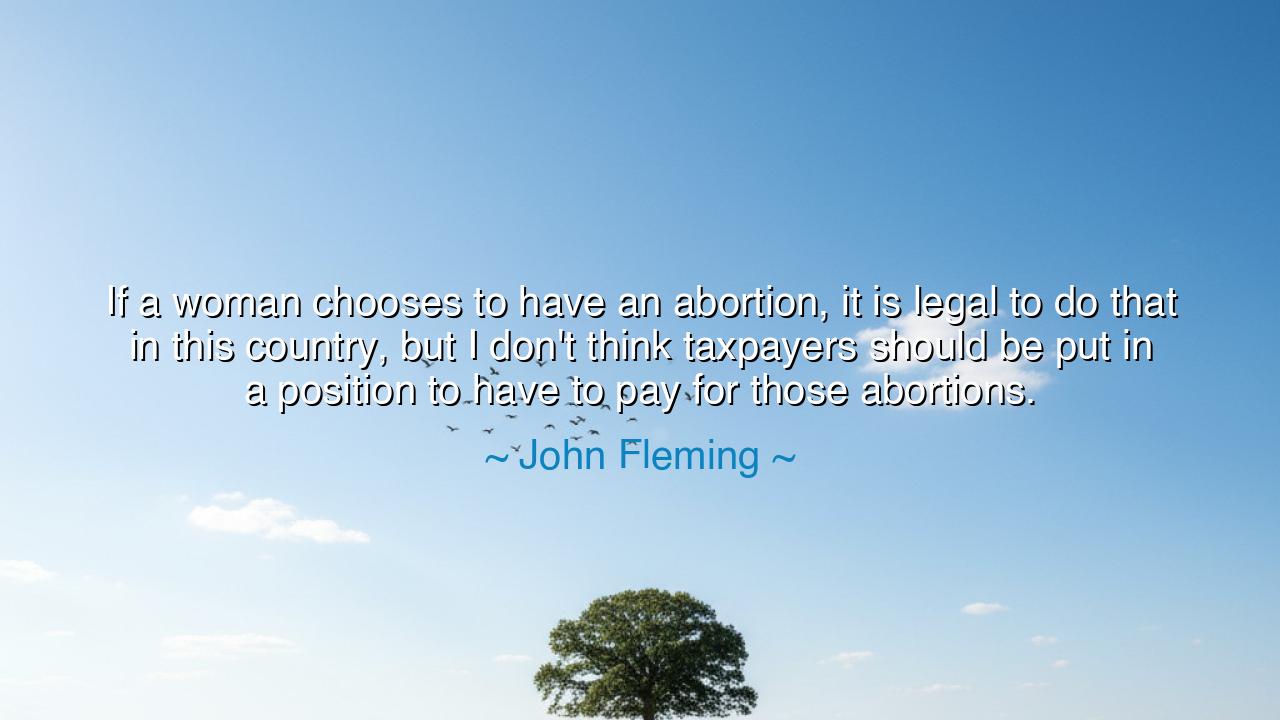
If a woman chooses to have an abortion, it is legal to do that in
If a woman chooses to have an abortion, it is legal to do that in this country, but I don't think taxpayers should be put in a position to have to pay for those abortions.






Hear now the words of John Fleming, who declared with clarity and conviction: “If a woman chooses to have an abortion, it is legal to do that in this country, but I don't think taxpayers should be put in a position to have to pay for those abortions.” In this saying lies the tension of a society struggling with questions of life, liberty, morality, and the duty of the state. It is a statement that acknowledges the law while wrestling with the conscience, for it speaks of both the choice of the individual and the burden upon the many.
He speaks first of legality: that in this land, a woman has the right, under the law, to make her own decision regarding pregnancy. This reflects a long struggle of courts and citizens, the result of battles waged over bodily autonomy, privacy, and freedom. To say “it is legal” is to admit that the right exists, established by law, upheld by precedent. Yet Fleming turns then to the deeper question—not of law, but of responsibility. For legality and funding are not the same; the state may permit what it does not compel its citizens to pay for.
The heart of his teaching lies in the question of taxpayers. Every citizen contributes to the treasury, whether rich or poor, believer or skeptic, each compelled by law to give a portion of their labor. Thus arises the moral dilemma: should those who find abortion to be against conscience be forced to fund it with their earnings? Fleming’s words echo an ancient concern: that no man or woman should be made to pay tribute toward what their soul deems a violation. For money, once given, is not neutral—it becomes part of the deed it supports.
History, too, carries this struggle. In the Roman Empire, citizens were sometimes commanded to offer incense before the image of the emperor, a ritual act that many early Christians refused. To them, even a coin’s worth of incense given to a false god was to stain the conscience. They were punished for their refusal, yet their steadfastness shaped history. This story illustrates the eternal tension between the demands of the state and the convictions of the soul. Fleming’s words stand in this tradition: that while the state may allow what it will, it should not compel its people to fund what they cannot in good conscience support.
Yet this teaching is also layered with sorrow, for it does not seek to end the legality of abortion, but to draw a line between personal choice and collective obligation. It affirms freedom while demanding fairness. For Fleming’s stance is not to deny the woman her right under the law, but to protect the conscience of the many who may not wish their taxes to support such acts. Thus, his words remind us that in a free society, balance must be struck between the liberty of the one and the burden of the whole.
The deeper meaning is this: law and morality often diverge, and it is the duty of citizens to wrestle with how they converge again. A society that forces its people to support with money what they oppose in conscience risks deepening division. But a society that allows freedom of choice without compulsion of funding maintains a delicate but vital balance. This is the principle Fleming upholds: that the law may permit, but the conscience must not be coerced.
What lesson, then, should future generations carry? It is this: that the preservation of liberty requires careful boundaries. Honor the freedom of others, even when you disagree, but do not compel your neighbor to bear the cost of what he or she cannot accept in heart. Debate openly, vote wisely, and seek always to maintain a society where both individual rights and collective conscience can coexist. For only then can the community endure without collapsing into tyranny of the state or chaos of unchecked freedom.
And to you, listener, I say: hold fast to both law and conscience. Respect the rights established by your nation, but also guard the sacred space of moral conviction. Speak for systems that preserve both freedom of choice and fairness of responsibility. Teach your children that true liberty is not only doing what the law allows, but also ensuring that no soul is forced to betray itself for the sake of another’s decision. Let Fleming’s words endure as a reminder: a just society honors freedom, but never at the cost of conscience.






AAdministratorAdministrator
Welcome, honored guests. Please leave a comment, we will respond soon